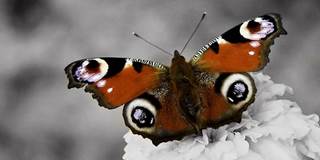Scientists used to describe insects as not having a central brain, making it difficult to imagine how insects could be conscious. But recent research suggests that subjective experience could be more widespread in the animal kingdom than we realize.
MELBOURNE – Last summer, a cabbage white butterfly laid its eggs on an arugula I was growing. Before long, the plant was swarming with green caterpillars, well disguised against the green leaves. I had other arugula plants, some distance away, that would give me plenty of leaves for our salads, and I didn’t want to use an insecticide, so I just left the caterpillars alone. Soon, every leaf was eaten down to the stalk. With nothing left to eat, the caterpillars, not ready to begin the next stage of their life cycle, all starved to death.
I had just been shown in microcosm something I had long accepted intellectually: Evolution is an impersonal natural process that has no regard for the wellbeing of the individual creatures it has produced. How, I sometimes wonder, can theists reconcile the world they observe with the belief that the world has been created by a being who is omniscient – and therefore saw that all this would happen – and yet is also good and worthy of being worshipped?
Christians have traditionally explained human suffering as the result of Adam’s original sin, which we have all supposedly inherited. But caterpillars are not descended from Adam. Descartes’ solution to that problem was to deny that animals are capable of feeling pain. When it comes to dogs or horses, however, few people could accept Descartes’ view, even in his own time. Today, scientific investigations of the anatomy, physiology, and behavior of mammals and birds count against it. But can’t we at least hope that caterpillars are incapable of feeling pain?

MELBOURNE – Last summer, a cabbage white butterfly laid its eggs on an arugula I was growing. Before long, the plant was swarming with green caterpillars, well disguised against the green leaves. I had other arugula plants, some distance away, that would give me plenty of leaves for our salads, and I didn’t want to use an insecticide, so I just left the caterpillars alone. Soon, every leaf was eaten down to the stalk. With nothing left to eat, the caterpillars, not ready to begin the next stage of their life cycle, all starved to death.
I had just been shown in microcosm something I had long accepted intellectually: Evolution is an impersonal natural process that has no regard for the wellbeing of the individual creatures it has produced. How, I sometimes wonder, can theists reconcile the world they observe with the belief that the world has been created by a being who is omniscient – and therefore saw that all this would happen – and yet is also good and worthy of being worshipped?
Christians have traditionally explained human suffering as the result of Adam’s original sin, which we have all supposedly inherited. But caterpillars are not descended from Adam. Descartes’ solution to that problem was to deny that animals are capable of feeling pain. When it comes to dogs or horses, however, few people could accept Descartes’ view, even in his own time. Today, scientific investigations of the anatomy, physiology, and behavior of mammals and birds count against it. But can’t we at least hope that caterpillars are incapable of feeling pain?